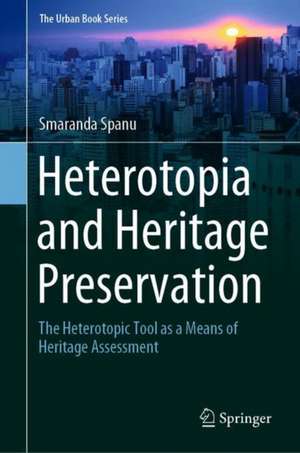Heterotopia and Heritage Preservation: The Heterotopic Tool as a Means of Heritage Assessment: The Urban Book Series
Autor Smaranda Spanuen Limba Engleză Hardback – 14 mai 2019
Din seria The Urban Book Series
- 15%
 Preț: 655.27 lei
Preț: 655.27 lei - 15%
 Preț: 640.06 lei
Preț: 640.06 lei - 15%
 Preț: 643.16 lei
Preț: 643.16 lei - 18%
 Preț: 1007.35 lei
Preț: 1007.35 lei - 15%
 Preț: 648.56 lei
Preț: 648.56 lei - 18%
 Preț: 1003.38 lei
Preț: 1003.38 lei - 15%
 Preț: 642.18 lei
Preț: 642.18 lei - 18%
 Preț: 948.92 lei
Preț: 948.92 lei - 15%
 Preț: 649.87 lei
Preț: 649.87 lei - 18%
 Preț: 731.59 lei
Preț: 731.59 lei - 18%
 Preț: 783.50 lei
Preț: 783.50 lei -
 Preț: 441.19 lei
Preț: 441.19 lei - 18%
 Preț: 897.02 lei
Preț: 897.02 lei - 15%
 Preț: 648.24 lei
Preț: 648.24 lei - 18%
 Preț: 949.42 lei
Preț: 949.42 lei - 18%
 Preț: 731.10 lei
Preț: 731.10 lei - 15%
 Preț: 649.87 lei
Preț: 649.87 lei - 15%
 Preț: 639.37 lei
Preț: 639.37 lei - 18%
 Preț: 950.52 lei
Preț: 950.52 lei - 15%
 Preț: 644.95 lei
Preț: 644.95 lei - 15%
 Preț: 640.06 lei
Preț: 640.06 lei - 18%
 Preț: 1126.52 lei
Preț: 1126.52 lei - 15%
 Preț: 645.60 lei
Preț: 645.60 lei - 15%
 Preț: 649.87 lei
Preț: 649.87 lei - 18%
 Preț: 1415.66 lei
Preț: 1415.66 lei - 15%
 Preț: 647.73 lei
Preț: 647.73 lei - 18%
 Preț: 894.46 lei
Preț: 894.46 lei - 18%
 Preț: 793.32 lei
Preț: 793.32 lei - 15%
 Preț: 659.70 lei
Preț: 659.70 lei - 18%
 Preț: 1004.99 lei
Preț: 1004.99 lei - 15%
 Preț: 645.79 lei
Preț: 645.79 lei - 18%
 Preț: 892.90 lei
Preț: 892.90 lei - 20%
 Preț: 564.41 lei
Preț: 564.41 lei - 18%
 Preț: 892.90 lei
Preț: 892.90 lei - 18%
 Preț: 952.09 lei
Preț: 952.09 lei - 15%
 Preț: 641.71 lei
Preț: 641.71 lei - 18%
 Preț: 1009.70 lei
Preț: 1009.70 lei - 18%
 Preț: 1401.61 lei
Preț: 1401.61 lei - 18%
 Preț: 1109.16 lei
Preț: 1109.16 lei - 18%
 Preț: 735.84 lei
Preț: 735.84 lei - 18%
 Preț: 726.37 lei
Preț: 726.37 lei - 18%
 Preț: 728.28 lei
Preț: 728.28 lei - 18%
 Preț: 1000.24 lei
Preț: 1000.24 lei - 15%
 Preț: 648.24 lei
Preț: 648.24 lei - 15%
 Preț: 640.06 lei
Preț: 640.06 lei - 18%
 Preț: 998.66 lei
Preț: 998.66 lei - 15%
 Preț: 657.90 lei
Preț: 657.90 lei
Preț: 963.15 lei
Preț vechi: 1174.58 lei
-18% Nou
Puncte Express: 1445
Preț estimativ în valută:
184.34€ • 198.99$ • 154.57£
184.34€ • 198.99$ • 154.57£
Carte disponibilă
Livrare economică 29 martie-12 aprilie
Preluare comenzi: 021 569.72.76
Specificații
ISBN-13: 9783030182588
ISBN-10: 3030182584
Pagini: 340
Ilustrații: X, 483 p. 6 illus.
Dimensiuni: 155 x 235 mm
Greutate: 0.95 kg
Ediția:1st ed. 2020
Editura: Springer International Publishing
Colecția Springer
Seria The Urban Book Series
Locul publicării:Cham, Switzerland
ISBN-10: 3030182584
Pagini: 340
Ilustrații: X, 483 p. 6 illus.
Dimensiuni: 155 x 235 mm
Greutate: 0.95 kg
Ediția:1st ed. 2020
Editura: Springer International Publishing
Colecția Springer
Seria The Urban Book Series
Locul publicării:Cham, Switzerland
Cuprins
Introduction.- Using Foucault’s Toolbox: Heterotopia as a New Tool for Assessing Built Heritage.- Heterotopia as Materialised Utopia. Utopias and their Architectural Embodiment. The ‘Heritage Utopia’.- Heterotopia of Function vs. the Heterotopia of Form. The Heterotopic Principles, their Interpretation and the Built Heritage. The Heritage Perspective.- Heritage as Heterotopia and the Heterotopic Profile as an Analysis Tool.
Textul de pe ultima copertă
This book approaches the field of built heritage and its practices by employing the concept of heterotopia, established by the French philosopher Michel Foucault. The fundamental understandings of heritage, its evolution and practices all reveal intrinsic heterotopic features (the mirror function, its utopic drive, and its enclave-like nature). The book draws on previous interpretations of heterotopia and argues for a reading of heritage as heterotopia, considering various heritage mechanisms – heritage selection, conservation and protection practices, and heritage as mnemonic device – in this regard. Reworking the six heterotopic principles, an analysis grid is designed and applied to various built heritage spaces (vernacular, religious architecture, urban 19th century ensembles). Guided through this theoretical itinerary, the reader will rediscover the heterotopic lens as a minor yet promising Foucauldian device that allows a better understanding of heritage and its everyday practices.
Caracteristici
Offers a practical perspective on an otherwise traditionally theoretical discussion (heterotopian studies) Presents a new method for analyzing heritage preservation, heritage values and the intervention on the built heritage Interdisciplinary appeal
